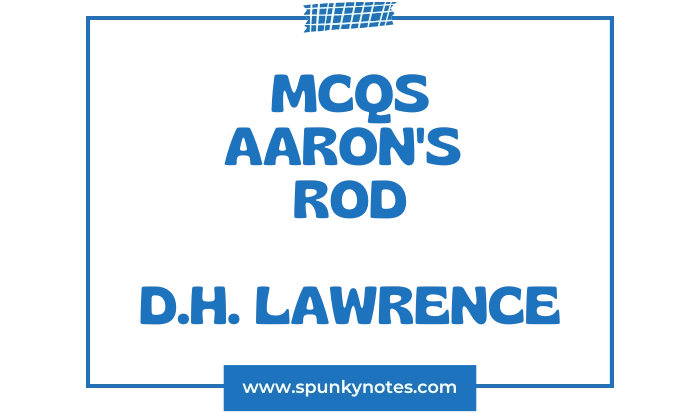

Estimated Reading Time: 17 min
Aaron’s Rod MCQs
1. What season and major event coincided with the start of the novel?
A. Autumn, Election
B. Summer, Strike
C. Christmas Eve, War over
D. Easter, Drought
2. What is Aaron Sisson’s role at his colliery?
A. Treasurer of the Pit
B. Mines Manager
C. Secretary to the Miners Union
D. Engine Driver
3. What domestic detail showed the house was settling due to the mines?
A. Cracks in the wall
B. The floorboards creaked
C. The doors did not fit
D. The chimney smoked
4. What was the ultimate fate of the blue ball?
A. Millicent kept it safely.
B. Marjory broke it.
C. It smashed on the tiles.
D. Aaron threw it in the fire.
5. What classical composer was Aaron playing on his piccolo?
A. Bach
B. Mozart
C. Beethoven
D. Corelli
6. What feeling was in the air as Aaron left home?
A. Profound relief
B. Nervous excitement
C. Deep melancholy
D. Quiet contentment
7. What did Josephine Ford do that suggested a snake’s flicker?
A. Stared fixedly
B. Licked her dry red lips
C. Twisted her body
D. Wept silently
8. What caused the light burning outside Shottle House?
A. Christmas decorations
B. A gas lamp
C. The pit-bank refuse fire
D. A military exercise
9. What is Aaron Sisson’s occupation, confirmed later in the scene?
A. Checkweighman
B. Law stationer
C. Medical assistant
D. Coal heaver
10. Aaron tells Josephine and the others he is doing what tonight?
A. Going home
B. Not going home
C. Staying with Lilly
D. Going to work
11. What does Aaron’s wife say about her husband’s nature?
A. Quiet, selfish through and through
B. Easily satisfied
C. Noble and trustworthy
D. Too talkative
12. What is Lilly’s primary profession?
A. Sculptor
B. Literary artist
C. Musician
D. Barrister
13. What famous literary work does Lilly reference regarding his situation?
A. Robinson Crusoes
B. Hamlet
C. Don Quixote
D. Moby Dick
14. What does Jim Bricknell define love as?
A. A battle
B. A necessity
C. The soul’s respiration
D. A vice
15. Josephine’s new political desire after Borrioboola-Gha fails:
A. Universal suffrage
B. Bloody revolution
C. Peace reform
D. Socialism
16. What was Aaron’s original career path, abandoned after three years?
A. Mining
B. Shopkeeping
C. Schoolteacher
D. Music
17. Aaron describes his reason for leaving his family as wanting:
A. Money
B. Fresh air/free room
C. A new career
D. A new lover
18. Where does Lilly live in Hampshire?
A. A mansion
B. A laborer’s cottage
C. A flat in town
D. A houseboat
19. What did Jim claim to be seeking from Lilly?
A. Financial help
B. Salvation
C. Music lessons
D. Legal advice
20. What specific criticism by Lilly provoked Jim to strike him?
A. His drinking habits
B. His maudlin crying to be loved
C. His financial instability
D. His bad manners
21. What word does Lilly think to himself when Jim claims to like him?
A. Traitor
B. Judas
C. Bully
D. Fool
22. How was Aaron Sisson found one cold grey afternoon in London?
A. Running across the street
B. Drunk and collapsed in the market
C. Playing his flute for money
D. Visiting Lilly’s flat
23. How did Lilly finally manage to improve Aaron’s health?
A. Gave him pills
B. Rubbed his abdomen with oil
C. Sent him to a hospital
D. Forced him to walk
24. What does Lilly call the relationship between him and his wife (Egoisme a deux)?
A. A perfect union
B. Self-conscious egoistic state
C. A partnership of equals
D. A modern necessity
25. When Aaron came home, what emotion did his wife Lottie exhibit, besides hate?
A. Hope
B. Indifference
C. Anger
D. Relief
26. Lottie describes Aaron as being too weak to do what?
A. Earn money
B. Leave the children
C. Love a woman and give her what she wants
D. Play music
27. What final action did Lottie take that drove Aaron away again?
A. Confessed her own sins
B. Clutched him by the shirt-neck
C. Threatened to call the police
D. Gave him money
28. Aaron resolves that love is what kind of contest?
A. Endless
B. Battle for mastery of the soul
C. Gentle yielding
D. Mutual respect
29. Where does Aaron alight in Italy, hoping to meet Lilly?
A. Florence
B. Venice
C. Novara
D. Naples
30. What comparison does Aaron use for the Florentine people’s movements?
A. Tiny figures on a big stage
B. Ants in a colony
C. Sheep herding
D. Prowling tigers
31. What comparison does Aaron make for Lottie’s constant will against him?
A. A hammer blow
B. A flat sheet of iron/cold snake
C. A beautiful flower
D. A gentle hand
32. What does the Marchese’s wife, the Marchesa, suffer from regarding music?
A. Too much rhythm
B. Hating all instruments
C. Nausea from chords/harmonies
D. Deafness
33. What does the Marchesa ask Aaron to play in the big room?
A. A piano sonata
B. With accompaniment
C. His flute, quite alone
D. A string quartette
34. How does Lilly describe the current state of European ideals (love, liberty, etc.)?
A. Renewing
B. Putrid, stinking
C. Evolving
D. Stable
35. What happened in the cafe after Lilly claimed to hate bullying?
A. A fight broke out
B. A waiter scolded them
C. A bomb exploded
D. The police arrived
36. What item of Aaron’s was destroyed in the explosion?
A. His overcoat
B. His watch
C. His flute
D. His music book
37. What advice did Lilly give Aaron about the destroyed instrument?
A. Save the parts
B. Throw it in the river
C. Buy a new one
D. Get compensation
38. What does Aaron call the broken flute section?
A. A warning
B. A loss
C. Aaron’s Rod
D. A souvenir
39. What was Aaron’s physical/mental state after his time with the Marchesa?
A. Healthy and restored
B. Blasted/withered
C. Exhausted but satisfied
D. Furious and bitter
40. What truth about marriage does Aaron realize (as told by Lilly)?
A. A husband is not a lover
B. All women want husbands
C. Love always lasts
D. Fidelity is crucial
41. Aaron plans to join Lilly because he feels a thread of destiny attaching him to whom?
A. The Marchesa
B. Lilly
C. Lottie
D. Francis
42. What does Lilly say is his only power regarding society?
A. Change it
B. Ignore it
C. Go his own way
D. Criticize it
43. Lilly says we must forget words like love and religion to find what?
A. Freedom
B. A new mode
C. Obedience
D. Happiness
44. According to Lilly, what are the two great dynamic urges in life?
A. Love and submission
B. Hate and war
C. Love and power
D. Money and freedom
45. Lilly claims the power-urge in man must issue forth, and woman must respond by:
A. Fighting back
B. Submitting subjectedly
C. Submitting livingly
D. Leaving the man
46. What does Lilly demand Aaron must accept and yield to?
A. The quicksands of woman
B. The love-mode
C. The deep power-soul in the individual man
D. Society
47. How does Aaron describe Lilly’s face during this argument?
A. Dark and remote/like a Byzantine eikon
B. Angry and frustrated
C. Warm and friendly
D. Shrewd and cunning
48. What characteristic of Lilly made his final words maddening and fascinating to Aaron?
A. His wealth
B. His indifference/finality
C. His logic
D. His beauty
49. What is the main characteristic of the new government system argued for by Lilly?
A. Total equality
B. Implicit obedience to a greater soul
C. Democratic freedom
D. Wealth redistribution
50. What physical detail does Aaron notice about the Florentine men gathered in the piazza?
A. Their clothes
B. Their subtle fearlessness
C. Their height
D. Their beards
Brief Overview
Aaron’s Rod is a novel by D. H. Lawrence. It begins with Aaron Sisson, an amateur flute player and coal miner, on Christmas Eve. He feels trapped by his marriage and his three children, so he suddenly decides to walk out on them.
Aaron travels first to London, carrying his flute with him. His flute, the “rod” of the title, becomes a symbol of his individual self and his art. He meets Rawdon Lilly, a writer with strong ideas about power and the need for men to submit to a greater male leader.
Aaron is interested in Lilly’s ideas but also resists them. He wants to be a free individual, but he also feels lost and alone. The two men eventually travel to Italy, moving through Florence and other cities, where Aaron has an unsatisfying affair with an Italian woman.
The novel’s climax happens when a bomb explodes in a café. The explosion destroys Aaron’s flute, which deeply shakes him. The story ends with Aaron and Lilly having a long conversation about the future of humanity. Lilly tells Aaron he must submit to a “greater soul,” but the novel ends with Aaron still alone and undecided.


